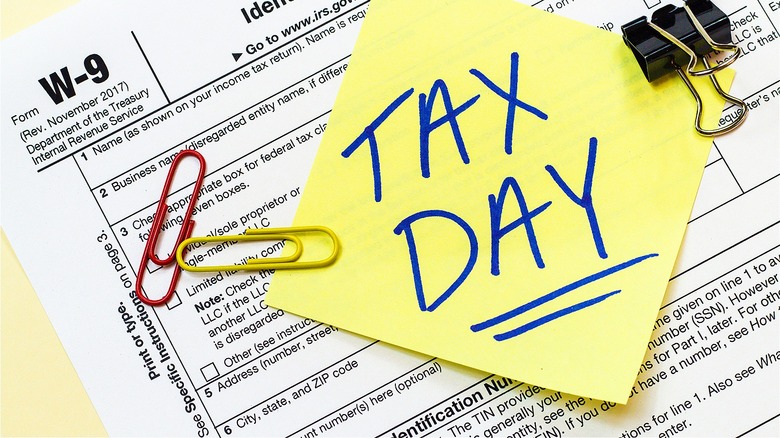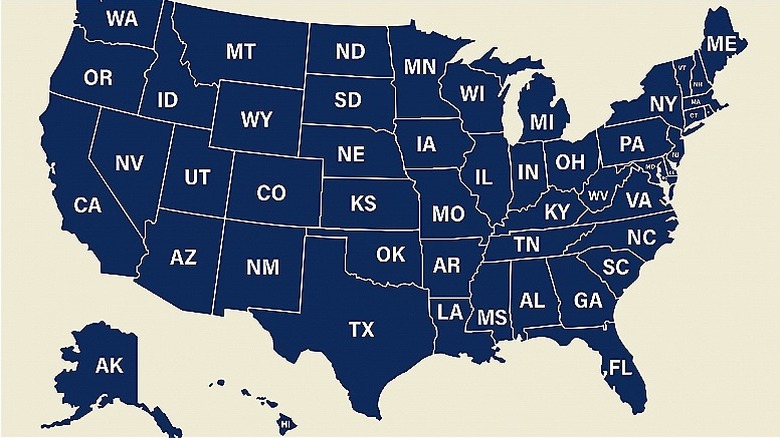When Is The Last Day To File Your Personal Taxes For 2023?
Ah, the coming of spring. The weather is warmer up, flowers are blooming, and your income tax return is due. If you're a procrastinator, you might be wondering when is the last day to file taxes this tax season. For most Americans, the last day to file personal federal income tax returns for the prior calendar year — and make payment, if necessary — is typically April 15 unless that day happens to fall on a weekend or state holiday. It's a Monday in 2024, which means that residents of 48 states need to file by April 15.
The two state exceptions? Residents of Maine and Massachusetts have an extra two days to file. Because those two states celebrate Patriot's Day on April 15 and Emancipation Day on April 16, the IRS will accept tax returns without penalty until April 17.
The IRS also provides extra filing time to any taxpayers living in areas recently affected by natural disasters or other emergencies, frequently weather-driven. For example, residents of certain parts of Tennessee impacted by recent tornadoes and wind storms have until June 17, 2024, to file their 2023 tax returns. On its website, the IRS maintains a full list of disasters that qualify for an extended tax deadline.
What about state income taxes?
Lucky residents of Alaska, Florida, Nevada, New Hampshire, South Dakota, Tennessee, Texas, Washington, and Wyoming don't pay any state income tax on their earnings. For the other 41 states, the filing deadline for personal state income taxes is typically the same as the IRS's federal filing deadline, which is April 15 (or April 17 in Maine and Massachusetts).
This said, there are a certain few exceptions. For instance, Delaware and Iowa residents have until April 30 to file, while denizens of Virginia and Louisiana have until May 1 and May 15, respectively, to submit their state income tax returns. And citizens of New Mexico have a unique conundrum in that mail-in returns are due April 15, but e-filers have until April 30.
To be clear, residents of those five states are still required to file their 2023 federal tax returns by April 15, but have an extra two to four weeks to send in their state returns. If you're unsure about the individual requirements of your state, visit its revenue department's website, which the IRS has thoughtfully compiled into a list.
If you're not ready, file an extension
Sometimes, even the best-laid plans go astray. Perhaps a life event or emergency has inadvertently gotten between you and successfully completing your return? Or a necessary piece of paperwork like a 1099 or W-2 from an employer was lost in the mail or is otherwise missing? If you're not ready to file by the federal deadline, make sure to ask for an extension by April 15 instead. Completing and submitting the — thankfully brief — IRS Form 4868 online or by mail will provide an automatic six-month extension. That translates into a new federal tax filing deadline of October 15.
You'll be in good company asking for an extension, too. In 2022, around 19 million U.S. taxpayers requested more time to get their returns in order. Do note that while filing an extension gives you an additional six months to file your return, it doesn't postpone the requirement to pay any tax liability. If you think you'll owe the IRS money, you'll need to estimate that amount to the best of your ability and make payment with your Form 4868 or else face penalties, such as fees and interest charges. On the other hand, if you're fairly confident you won't owe anything — or may be entitled to a refund — it's okay to send the extension form without any payment.
Finally, if you're an early bird who likes to file your taxes as soon as possible, the IRS announced that eager taxpayers can start submitting their 2023 returns on January 18, 2024.


